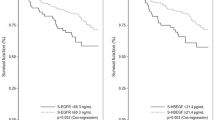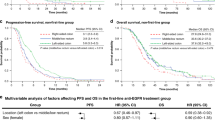Abstract
PURPOSE: The epidermal growth factor receptor and its various ligands (epidermal growth factor, transforming growth factor-alpha, amphiregulin, heparin-binding epidermal growth factor, heregulin, and betacellulin) have been implicated in growth and regeneration of intestinal mucosa and might be related to the development and progression of gastrointestinal tumors. Although some studies have investigated levels of epidermal growth factor receptor by radioligand binding studies, none of them have further analyzed these levels in patients with rectal cancer and investigated their prognostic value. METHODS: We quantitatively determined tumor epidermal growth factor receptor levels in 38 patients with colorectal cancer compared with adjacent normal mucosa by iodine-125–labeled epidermal growth factor binding studies and Scatchard analysis. Patients were followed up for 49.5 ± 32.2 (range, 2–120) months. RESULTS: Epidermal growth factor receptor capacity was increased in invasive colorectal carcinomas according to T classification (P < 0.001), tumors with lymph node infiltration (P = 0.038), and advanced International Union Against Cancer stage (P < 0.001). Survival of colorectal cancer was reduced in patients with advanced International Union Against Cancer stage (P < 0.001), tumors with positive lymph nodes (P < 0.001), and tumors with elevated epidermal growth factor receptor levels (P = 0.024). In rectal cancer patients, poor prognosis was associated with advanced International Union Against Cancer stage (P = 0.029), tumors with lymph node infiltration (P = 0.040), and increased epidermal growth factor receptor levels (P = 0.002). Multivariate Cox regression analysis indicated that elevated levels of epidermal growth factor receptor were an independent predictor of reduced survival in patients with rectal cancer (P = 0.005). CONCLUSION: The epidermal growth factor receptor/ligand system appears to be involved in tumor development and tumor progression of colorectal carcinomas, with prognostic implication especially in patients with invasive rectal carcinomas. These patients might take advantage of therapies that specifically block epidermal growth factor receptor–mediated signal transduction.
Similar content being viewed by others
References
MB Sporn AB Roberts (1985) ArticleTitleAutocrine growth factors and cancer Nature 313 745–747
S Cohen G Carpenter L King (1980) ArticleTitleEpidermal growth factor-receptor-protein kinase interactions J Biol Chem 258 4834–4842
A Ullrich J Schlessinger (1990) ArticleTitleSignal transduction by receptors with tyrosine kinase activity Cell 61 203–212
E Tahara (1995) ArticleTitleGenetic alterations in human gastrointestinal cancers Cancer 75 1410–1417
J Downward P Parker MD Waterfield (1985) ArticleTitleAutophosphorylation sites in the epidermal growth factor receptor Nature 311 483–485
G Carpenter S Cohen (1979) ArticleTitleEpidermal growth factor Annu Rev Biochem 48 193–216
AB Schreiber TA Libermann I Lax Y Yarden J Schlinger (1983) ArticleTitleBiological role of epidermal growth factor-receptor clustering J Biol Chem 258 846–853
J Downward Y Yarden E Mayes et al. (1984) ArticleTitleClose similarity of epidermal growth factor receptor and v-erb-B oncogen protein sequences Nature 307 521–527
LT Malden U Novak AW Burgiss (1989) ArticleTitleExpression of transforming growth factor alpha messenger RNA in the normal and neoplastic gastro-intestinal tract Int J Cancer 43 380–384
S Tanaka K Imanishi M Yoshihara et al. (1991) ArticleTitleImmunoreactive transforming growth factor alpha is commonly present in colorectal neoplasia Am J Pathol 139 123–129
RJ Coffey GD Shipley HL Moses (1986) ArticleTitleProduction of transforming growth factors by human colon cancer lines Cancer Res 46 1164–1169
MA Anzano D Riemann, W Prichett DF Bowen-Pope R Greig (1989) ArticleTitleGrowth factor production by human colon carcinoma cells Cancer Res 49 2898–2904
W Yasui H Sumiyoshi J Hata et al. (1988) ArticleTitleExpression of epidermal growth factor in human gastric and colonic carcinomas Cancer Res 48 137–141
RJ Steele BE Kelly O Eremin (1990) ArticleTitleEpidermal growth factor receptor expression in colorectal cancer Br J Cancer 77 1352–1354
E Rothbauer K Mann B Wiebecke et al. (1989) ArticleTitleEpidermal growth factor receptors and epidermal growth factor-like activity in colorectal mucosa, adenomas and carcinomas Klin Wochenschr 67 518–513
PG Koenders WH Peters T Wobbes LV Beex FM Nagengast TJ Benrad (1992) ArticleTitleEpidermal growth factor receptor levels are lower in carcinomatous than normal colorectal tissue Br J Cancer 65 189–192
P Borlinghaus S Wieser R Lamerz (1993) ArticleTitleEpidermal growth factor, transforming growth factor-a, and epidermal growth factor receptor content in normal and carcinomatous gastric and colonic tissue Clin Invest 71 903–907
J Mendelsohn (2000) ArticleTitleBlockade of receptors for growth factors Clin Cancer Res 6 747–753
J Baselga (2000) ArticleTitleNew therapeutic agents targeting the epidermal growth factor receptor J Clin Oncol 18 54–59
F Ciardiello G Tortora (2001) ArticleTitleA novel approach in the treatment of cancer Clin Cancer Res 7 2958–2970
A Pfeiffer E Rothbauer B Wiebecke E Pratschke HJ Kraemling K Mann (1990) ArticleTitleIncreased epidermal growth factor receptors in gastric carcinomas Gastroenterology 98 961–967
PJ Munson D Rodbard (1980) ArticleTitleLIGAND Anal Biochem 107 159–171
DE Neal C Marsh MK Bennett et al. (1985) ArticleTitleEpidermal growth factor receptors in human bladder cancer Lancet 1 366–368
JR Sainsbury JR Farndon GV Sherbet AL Harris (1985) ArticleTitleEpidermal growth-factor receptors and oestrogen receptors in human breast cancer Lancet 1 364–366
Y Itakura H Sasano C Shiga et al. (1994) ArticleTitleEpidermal growth factor receptor overexpression in esophageal carcinoma Cancer 74 795–804
R Kopp M Ruge E Rothbauer et al. (2002) ArticleTitleImpact of epidermal growth factor (EGF) radioreceptor analysis on long term survival of gastric cancer patients Anticancer Res 22 1161–1168
K Koretz P Schlag P Möller (1990) ArticleTitleExpression of epidermal growth factor in normal colorectal mucosa, adenoma and carcinoma Virchows Arch A Pathol Anat 416 343–349
CA Maurer H Friess B Kretschman et al. (1998) ArticleTitleIncreased expression of erbB3 in colorectal cancer is associated with concomitant increase in the level of erbB2 Hum Pathol 29 771–777
S Higashiyama JA Abraham J Miller JC Fiddes M Klagsbrun (1991) ArticleTitleA heparin-binding growth factor secreted by macrophage-like cells that is related to EGF Science 252 936–939
A Ullrich L Coussens JS Hayflick et al. (1984) ArticleTitleHuman epidermal growth factor receptor cDNA sequence and aberrant expression of the amplified gene in A431 epidermoid carcinoma cells Nature 309 418–425
NR Lemoine S Jain F Silvestre et al. (1991) ArticleTitleAmplification and overexpression of the EGF receptor and c-erbB-2 proto-oncogenes in human stomach cancer Br J Cancer 64 79–83
H Masui A Wells CS Lazar MG Rosenfeld GN Gill (1991) ArticleTitleEnhanced tumorigenesis of NR6 cells which express non-down regulating epidermal growth factor receptors Cancer Res 51 6170–6175
JL Countaway IC Northwood RJ Davis (1989) ArticleTitleMechanism of phosphorylation of the epidermal growth factor receptor at threonine 669 J Biol Chem 264 10828–35
R Kopp B Noelke G Sauter FW Schildberg G Paumgartner A Pfeiffer (1991) ArticleTitleAltered protein kinase C activity in biopsies of human colonic adenomas and carcinomas Cancer Res 51 205–210
M Kusonoki Y Sakanoue T Hatada H Yanagi T Yamamura J Utsunomiya (1992) ArticleTitleProtein kinase C activity in human colonic adenoma and colorectal carcinoma Cancer 69 24–30
G Verstovsek A Byrd MR Frey et al. (1998) ArticleTitleColonocyte differentiation is associated with increased expression and altered distribution of protein kinase C isoenzymes Gastroenterology 115 75–85
R Emkey CR Kahn (1997) ArticleTitleCross-talk between phorbol ester-mediated signaling and tyrosine kinase proto-oncogenes. I. Activation of protein kinase C stimulates tyrosine phosphorylation and activation of ErbB2 and ErbB3 J Biol Chem 272 31172–81
N Chen WY Ma QB She et al. (2001) ArticleTitleTransactivation of the epidermal growth factor receptor is involved in 12-O-tetradecanoylphorbol-13-acetate-induced signal transduction J Biol Chem 14 46722–8
P Maruvada AE Levine (1999) ArticleTitleIncreased transforming growth factor-alpha levels in human colon carcinoma cell lines over-expressing protein kinase C Int J Cancer 80 72–77
E Odintsova T Sugiura F Berditchevski (2000) ArticleTitleAttenuation of EGF receptor signalling by a metastasis suppressor, the tetraspanin CD82/KAI-1 Curr Biol 10 1009–1012
R Goldman RB Levy E Peles Y Yarden (1990) ArticleTitleHeterodimerization of the erbB-1 and erbB-2 receptors in human breast carcinoma cells Biochemistry 29 11024–8
N Gill A Malik A Potti R Talukdar A Saberi SA Mehdi (2002) ArticleTitleHER-2/neu overexpression in colonic malignancies Gastroenterology 122 248–249
S Venkateswarlu DM Dawson P St Clair A Gupta JK Willson MG Brattain (2002) ArticleTitleAutocrine heregulin generates growth factor independence and block apoptosis in colon cancer cells Oncogene 21 78–86
M Bos J Mendelsohn YM Kim et al. (1997) ArticleTitlePD153035, a tyrosine kinase inhibitor, prevents epidermal growth factor receptor activation and inhibits growth of cancer cells in a receptor number-dependent manner Clin Cancer Res 3 2099–2106
J Mendelsohn (1997) ArticleTitleEpidermal growth factor receptor inhibition by a monoclonal antibody as anticancer therapy Clin Cancer Res 3 2703–2707
WE Karnes SG Weller PN Adjei et al. (1998) ArticleTitleInhibition of epidermal growth factor receptor kinase induces protease-dependent apoptosis in human colon cancer cells Gastroenterology 114 930–939
G Partik K Hochegger M Schörkhuber B Marian (1999) ArticleTitleInhibition of epidermal growth factor receptor dependent signalling by tyrphostins A25 and AG1478 blocks growth and induces apoptosis in colorectal tumor cells in vitro J Cancer Res Clin Oncol 125 379–388
PJ Jensen U Rodeck (1993) ArticleTitleAutocrine/paracrine regulation of keratinocyte urokinase plasminogen activator through the TGF-alpha/EGF receptor J Cell Physiol 155 333–339
E Lengyel S Ried MM Heiss C Jaeger M Schmitt H Allgayer (2001) ArticleTitleRas regulation of urokinase-type plasminogen activator Methods Enzymol 333 105–116
F Ciardiello R Caputo R Bianco et al. (2001) ArticleTitleInhibition of growth factor production and angiogenesis in human cancer cells by ZD1839 (Iressa), a selective epidermal growth factor receptor tyrosine kinase inhibitor Clin Cancer Res 7 1459–1465
G Gonzalez T Crombet M Catala et al. (1998) ArticleTitleA novel cancer vaccine composed of human-recombinant epidermal growth factor linked to a carrier protein Ann Oncol 9 431–435
G Lammering TH Hewit WT Hawkins et al. (2001) ArticleTitleEpidermal growth factor as a genetic therapy target for carcinoma cell radiosensitization J Natl Cancer Inst 93 921–929
SM Huang PM Harari (2000) ArticleTitleModulation of radiation response after epidermal growth factor receptor blockade in squamous cell carcinomas Clin Cancer Res 6 2166–2174
C Camma M Giunta F Fiorica L Pagliaro A Craxi M Cottone (2000) ArticleTitlePreoperative radiotherapy for resectable rectal cancer JAMA 284 1008–1015
E Kapiteijn CA Marijnen ID Nategaal et al. (2001) ArticleTitlePreoperative radiotherapy combined with total mesorectal excision for resectable rectal cancer N Engl J Med 345 638–646
Author information
Authors and Affiliations
About this article
Cite this article
Kopp, R., Rothbauer, E., Mueller, E. et al. Reduced Survival of Rectal Cancer Patients With Increased Tumor Epidermal Growth Factor Receptor Levels. Dis Colon Rectum 46, 1391–1399 (2003). https://doi.org/10.1007/s10350-004-6756-1
Issue Date:
DOI: https://doi.org/10.1007/s10350-004-6756-1




